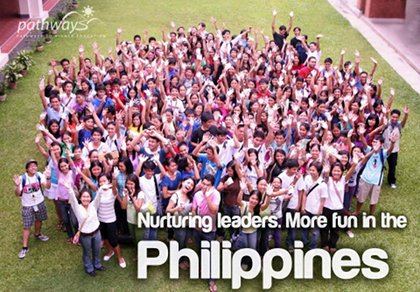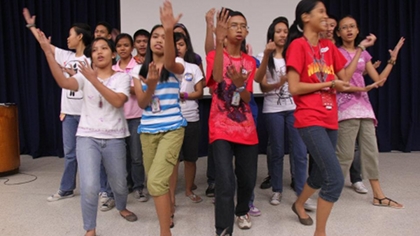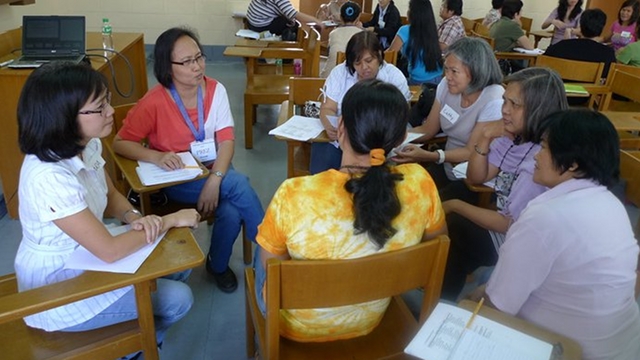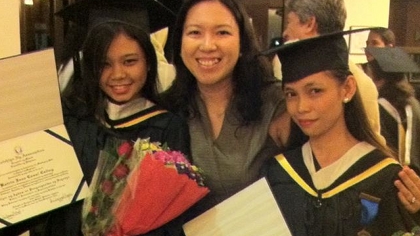SUMMARY
This is AI generated summarization, which may have errors. For context, always refer to the full article.
MANILA, Philippines – The son of a taho vendor from flood-prone Marikina City, college scholar Archie Dolit knew how it is to be flooded. So Dolit, along with two others, for a software development contest, devised a Marikina River flood alarm that would alert residents when and where to evacuate.
Another scholar, Ella Marie Balsa, wrote a thesis that was hailed the best in an exclusive girls’ school in Makati City. Balsa, the daughter of a messenger and a laundrywoman, published a study on the ideal pre-school curriculum for Quezon City public schools.
Dolit and Balsa both came from public high schools, and received scholarships from private colleges that equipped them to work on these projects.
Their scholarship formation director, Solvie Nubla-Lee, takes pride in them as the “next-generation Filipino leaders from the grassroots.” Lee, director of the group Pathways to Higher Education, tells Rappler it is crucial to nurture leaders like them from public schools.
Lee, however, notes that Philippine leaders usually come from an upscale context – “the usual places, the usual families, and mostly private schools.”
“We feel that nobody really understands the problem of the masses more than the people who’ve actually been there,” Lee says.

Dolit agrees with Lee. “I believe that it is important for public school students to develop leadership skills because we understand and experience the problems of the communities, and therefore can propose solutions to these problems,” he says.
In the Philippines, private school graduates often come from middle-class and affluent families, able to afford tuition fees costing up to P100,000 annually, as opposed to public schools that generally offer schooling for free. Lacking funds, public schools then tend to pale in comparison with their private counterparts. (More in the story, “Needed: Toilets, books, classrooms.”)
Still, most Filipino students attend public schools – 92% of all elementary students and 80% of all high school students, based on the latest government statistics.
Focus on leadership
Lee’s group, Pathways, has helped over 200 underprivileged students graduate from college since the group was founded in 2002. Over the years, the group has assisted public school students in catching up with their private school counterparts especially in terms of academics.
Lee says Pathways, which marked its 10th anniversary last April, has now explicitly said its main goal is to turn public school students into better leaders.
“Our country hasn’t really moved forward, as we can see, so we felt the need to really find students who are talented, who are capable of higher education, and moreover to nurture them into leaders, so that when they graduate, and eventually join different industries. They can truly now become leaders as well,” Lee explains.
Complementing academics, formative workshops highlight the Pathways style of training, according to Lee.

These workshops include self-awareness and goal-setting exercises, and even self-enhancement and presentation activities with renowned director Ricky Abad.
Systemic problems
It will take more than workshops, however, to remedy the problems that inhibit leadership among public school students.
For one, poverty and the condition of public education tend to dampen the hope of students. “They really feel that they can’t compete,” Lee says. “I don’t even think they recognize that they’re good, precisely because they (tend to only notice what they’re lacking).”
Compounding the problem, public schools tend to give preferential treatment to student achievers, Lee says. “In public schools, it’s just the honors class then everyone else.”
“(We need) a more effective way of identifying talent,” Lee explains.
The government has recently moved to address the problems of Philippine schools, implementing a revised curriculum called the K+12 program that aims to add two years to the country’s 10-year basic education system.

The effects of the program, which the government implements beginning this school year, remain to be seen. (Read: K to 12 program launched.)
Family is key
For experts, however, the key to student leadership is still primarily the family.
Unfortunately, a number of Filipino families fail to give their children the needed encouragement. “If you think about it, the people who have been successful also in life…at least here in the Philippines, have strong parent support,” Lee explains.
Former Ateneo president Fr Bienvenido Nebres, who advocates educational reforms, shares the same views. He cites the example of countries that ace international exams like the Trends in International Mathematics and Science Study (TIMSS), which the Philippines has performed poorly in.
“I have pointed out in many talks that the success of these countries in international comparative studies such as TIMSS is not primarily due to economics and greater funding, but more to values such as an emphasis on effort and hard work, family involvement, and family support,” Nebres writes in his foreword to the book, Magaling ang Pinoy: How and Why Filipino Public School Students Achieve.

An Ateneo-commissioned study, which is a subject of the book, recommends 10 basic ways for parents to help their children excel in school:
-
Develop good study habits
-
Create a conducive environment for study
-
Communicate regularly and well
-
Encourage love for reading and judicious multimedia use
-
Ensure solid grounding in the fundamentals
-
Emphasize effort more than ability
-
Promote genuine self-worth
-
Discipline with love
-
Set personal, academic, and life goals
-
Be there for the family
For PH progress
Lee says Filipino public school graduates, especially the impoverished, will understandably help their families first after finishing college.
“But what has been clear to us is that, now, especially with the alumni, it’s clear to them that yes, I have to help my family first, but then I’m already thinking of ways that I can be of service to the country,” Lee says.

She speaks of Pathways graduates who returned to teach in their public schools, or began contributing funds to Pathways as well. She sees such acts of generosity – and nationalism – as eventually boosting Philippine progress.
Who knows, we might yet see a Philippine president coming from a public school. – Rappler.com
You might like:
Elsewhere in Rappler:
- [Nation] Mistresses, math and men: Miriam’s latest pick-up lines
- [Thought Leaders] Debt free? by Ronald U. Mendoza
- [Sports] Beckham gets cut from Olympic team
- [Life & Style] Uniqlo to phase out wool from mulesing
- [World] 3 Chinese astronauts return to Earth
Add a comment
How does this make you feel?
There are no comments yet. Add your comment to start the conversation.